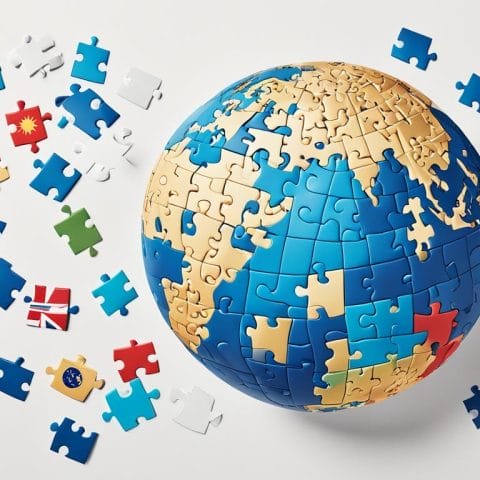Have you ever wondered what sets exceptional employees apart? What if there was a secret ingredient that unlocked higher productivity, enhanced employee well-being, and created a positive work environment? It turns out, there is. And it’s called emotional intelligence.
Emotional intelligence (EI) is the key to unlocking the full potential of individuals in the workplace. It encompasses self-awareness, self-regulation, empathy, and social skills, all of which are vital in building effective relationships, resolving conflicts, and making informed decisions.
Join us as we delve into the world of emotional intelligence and discover how it transforms workplaces into thriving and harmonious ecosystems. Prepare to challenge traditional notions and uncover the extraordinary power of emotional intelligence within the workplace.
Key Takeaways:
- Emotional intelligence plays a pivotal role in boosting workplace productivity and employee well-being.
- Self-awareness, self-regulation, empathy, and social skills are the key elements of emotional intelligence.
- Emotional intelligence fosters effective communication, conflict resolution, and teamwork.
- Leaders with high emotional intelligence inspire and motivate their teams, creating a positive work culture.
- Emotional intelligence can be developed through strategies such as emotional regulation and self-reflection.
The Elements of Emotional Intelligence
Emotional intelligence encompasses various key elements that contribute to effective interpersonal interactions and personal growth. Understanding these elements is essential for cultivating emotional intelligence in the workplace and in our daily lives. The five key elements of emotional intelligence are self-awareness, self-regulation, motivation, empathy, and social skills.
1. Self-Awareness
Self-awareness involves recognizing and understanding one’s own emotions and their influence on behavior. It means being conscious of our strengths, weaknesses, values, and beliefs, allowing us to navigate our emotions in a more mindful manner. By developing self-awareness, we gain a better understanding of how our emotions impact our actions and relationships with others.
2. Self-Regulation
Self-regulation refers to the ability to control and manage our emotions, avoiding impulsive reactions and maintaining emotional balance. It involves self-discipline, adaptability, and the capacity to think before acting. By practicing self-regulation, we can make more rational decisions, handle stress effectively, and maintain strong relationships with colleagues and partners.
3. Motivation
Motivation is the driving force behind our actions and goals. It is the inner passion and determination that propels us to achieve what we desire. Individuals with high emotional intelligence are internally motivated and set meaningful goals for themselves. They persevere through challenges, derive satisfaction from their accomplishments, and inspire others to reach their full potential.
4. Empathy
Empathy is the ability to understand and share the feelings of others. It involves actively listening, being attentive to non-verbal cues, and demonstrating genuine care for others’ experiences. By cultivating empathy, we enhance our communication skills, build stronger relationships, and create a supportive and inclusive work environment.
5. Social Skills
Social skills encompass a range of abilities that enable effective interaction and collaboration with others. These skills include communication, conflict resolution, teamwork, and the ability to build positive relationships. By developing social skills, we foster open communication, establish trust, and create a harmonious and productive work environment.
Understanding and developing these five elements of emotional intelligence is crucial for personal growth, professional success, and building strong relationships with colleagues and partners. By enhancing our self-awareness, self-regulation, motivation, empathy, and social skills, we can navigate complex situations, communicate effectively, and foster a positive and supportive work culture.
The Importance of Emotional Intelligence in the Workplace

Emotional intelligence plays a crucial role in the workplace, impacting various aspects that contribute to a successful and harmonious work environment. It encompasses skills such as interpersonal skills, conflict management, communication, teamwork, and productivity. Individuals with high emotional intelligence are better equipped to navigate the dynamics of the workplace, fostering positive relationships and achieving optimal outcomes.
Interpersonal Skills
A key component of emotional intelligence is the ability to effectively navigate interpersonal relationships. Individuals with high emotional intelligence possess the skills necessary to understand and connect with others, building rapport and fostering collaboration. By recognizing and appreciating the perspectives and emotions of colleagues, they can create a supportive and inclusive work environment.
Conflict Management
Conflicts are inevitable in any workplace, but individuals with emotional intelligence are better equipped to manage and resolve them constructively. They can identify and address the underlying causes of conflicts, utilizing empathy, communication skills, and problem-solving abilities to find mutually beneficial resolutions. This minimizes workplace disruptions and contributes to a harmonious and productive atmosphere.
Effective Communication
Communication is at the core of any successful workplace. Emotional intelligence enables individuals to understand and convey information effectively, both verbally and non-verbally. By being aware of their own emotions and recognizing the emotions of others, individuals can tailor their communication to be clear, empathetic, and influential. This leads to improved collaboration, greater understanding, and the efficient exchange of ideas.
Teamwork
Emotional intelligence enhances teamwork by fostering trust, collaboration, and a sense of cohesion among team members. Individuals with high emotional intelligence understand the importance of diversity and inclusivity within teams and value the input and perspectives of others. This creates an environment where ideas are freely shared, conflicts are resolved constructively, and collective goals are achieved.
Productivity
Emotional intelligence positively impacts productivity in the workplace by promoting self-regulation, focus, and goal-oriented behavior. Individuals with high emotional intelligence can effectively manage their own emotions, adapting to changing circumstances and remaining calm under pressure. This enables them to make informed decisions, prioritize tasks, and maintain a high level of productivity, even in challenging situations.
“Emotional intelligence is not just important for personal wellbeing, but also critical for success in the workplace. It is the foundation for strong relationships, effective communication, and collaborative teamwork.”
By cultivating emotional intelligence in the workplace, organizations can create a positive and supportive environment that fosters employee engagement, satisfaction, and overall success. Investing in emotional intelligence development initiatives can yield numerous benefits for individuals and the organization as a whole, leading to improved productivity, enhanced employee well-being, and a thriving work culture.
The Role of Emotional Intelligence in Leadership
Effective leaders often possess high emotional intelligence. They are self-aware, understanding their strengths and weaknesses, and are able to view situations objectively. This self-awareness allows them to act with humility and empathy, appreciating and valuing employees, which contributes to their happiness and productivity. Leaders with emotional intelligence are able to motivate and inspire their teams, creating a positive work culture and driving better results.
“A leader is one who knows the way, goes the way, and shows the way.” – John C. Maxwell
Leaders who possess self-awareness are conscious of their emotions and how those emotions impact their decision-making and interactions with others. By recognizing their strengths and weaknesses, they can delegate tasks effectively, surrounding themselves with individuals who complement their skill set. This self-awareness also enables them to view situations objectively, making informed decisions based on a clear understanding of the circumstances.
Humility is another essential trait of emotionally intelligent leaders. By acknowledging their limitations and seeking input from others, they create an environment that encourages open communication and collaboration. They understand that they don’t have all the answers and value different perspectives, fostering a culture of continuous learning and growth.
Empathy is a critical attribute that allows leaders to understand and connect with their employees. By taking the time to listen and understand their team members’ experiences and emotions, leaders can address their concerns effectively and provide the necessary support. This empathetic approach creates a sense of trust and belonging, leading to higher levels of employee satisfaction and engagement.
The Benefits of Emotional Intelligence in Leadership
The role of emotional intelligence in leadership extends beyond creating a positive work culture. Leaders who possess emotional intelligence can:
- Inspire and motivate their teams
- Build strong relationships with colleagues and team members
- Resolve conflicts effectively
- Make informed and empathetic decisions
- Support employee development and growth
By incorporating emotional intelligence into their leadership style, individuals can become effective leaders who inspire their teams, foster innovation, and drive organizational success.
| Benefits of Emotional Intelligence in Leadership | Key Points |
|---|---|
| Inspire and motivate their teams | Leaders with emotional intelligence can inspire and motivate their teams by understanding their individual needs, providing guidance, and creating a supportive work environment. |
| Build strong relationships with colleagues and team members | Emotionally intelligent leaders prioritize building strong relationships by actively listening, valuing diverse perspectives, and fostering open communication. |
| Resolve conflicts effectively | Leaders with emotional intelligence can effectively address conflicts by understanding the underlying emotions, facilitating open dialogue, and seeking win-win solutions. |
| Make informed and empathetic decisions | By considering the emotions and perspectives of others, emotionally intelligent leaders can make informed decisions that prioritize the well-being and needs of their team members. |
| Support employee development and growth | Emotionally intelligent leaders actively support the development and growth of their team members by providing constructive feedback, identifying opportunities for growth, and fostering a culture of continuous learning. |
Strategies for Developing Emotional Intelligence
Emotional intelligence is a valuable skill that can be developed through various strategies. By practicing emotional regulation, individuals can learn to slow down their reactions to emotions and gain a deeper understanding of the underlying reasons behind them. This awareness allows for better self-management and the ability to respond to situations in a more thoughtful and balanced manner.
An important aspect of developing emotional intelligence is self-reflection. Taking the time to reflect on one’s strengths and weaknesses helps individuals gain a better understanding of themselves. This self-awareness enables individuals to seek help when needed, leverage their strengths, and work on improving their weaknesses effectively.
Another key strategy for developing emotional intelligence is understanding non-verbal communication cues. Non-verbal communication, such as facial expressions, body language, and tone of voice, can convey emotions that may not be explicitly expressed. Developing the ability to interpret and understand these cues can greatly enhance one’s comprehension of others’ emotions, leading to better empathy and overall communication.
Effective communication skills are also essential for enhancing emotional intelligence. Clear and focused messaging, active listening, and giving full attention to others are all important aspects of effective communication. By honing these skills, individuals can foster stronger connections, build trust, and better understand the emotions and needs of others.
“Emotional intelligence can be developed through self-reflection, practicing emotional regulation, understanding non-verbal communication, and improving effective communication skills.”
Developing emotional intelligence is an ongoing process that requires self-awareness, practice, and an openness to learning and growth. By implementing these strategies, individuals can enhance their emotional intelligence, leading to improved relationships, better decision-making, and greater overall success.
Strategies for Developing Emotional Intelligence
| Strategy | Description |
|---|---|
| Emotional Regulation | Practice slowing down reactions to emotions, identify underlying reasons, and respond in a balanced manner. |
| Self-reflection | Gain self-awareness by reflecting on strengths and weaknesses, seeking help, and leveraging skills effectively. |
| Understanding Non-Verbal Communication | Develop the ability to interpret non-verbal cues like facial expressions and body language to better understand others’ emotions. |
| Effective Communication | Hone skills like clear messaging, active listening, and giving full attention to foster stronger connections and understand others’ emotions and needs. |
Images:
The Impact of Emotional Intelligence on Hiring Processes
Emotional intelligence assessment has emerged as a crucial factor in the hiring process. Employers now recognize the significance of emotional intelligence in candidates, considering it as a strong indicator of their potential fit within the company’s culture and their capabilities to contribute to the organization’s success. Assessing emotional intelligence during the hiring process allows organizations to identify individuals with high emotional intelligence, leadership potential, and the ability to effectively manage interpersonal relationships.
Unlike technical skills that can be trained, emotional intelligence is more difficult to develop. Therefore, organizations are investing in the assessment of emotional intelligence to ensure they bring onboard candidates who not only possess the necessary technical skills but also demonstrate qualities such as empathy, self-awareness, and effective communication.
Emotional intelligence assessment enables employers to gain valuable insights into a candidate’s ability to navigate the complexities of the workplace, handle conflicts, and communicate effectively with colleagues and clients. It aids in identifying individuals who can contribute to a positive work environment and promote healthy team dynamics.
By incorporating emotional intelligence assessment in the hiring process, organizations cultivate a workforce that is equipped to inculcate emotional intelligence throughout the company, strengthening leadership potential and promoting overall development. Candidates with high emotional intelligence are likely to exhibit qualities that contribute to a positive work culture and create a conducive environment for collaboration, innovation, and growth.
Development investments in emotional intelligence assessment not only improve the quality of hires but also enhance the long-term success of the organization. By prioritizing emotional intelligence, companies demonstrate their commitment to building a team of individuals who possess the key qualities necessary for effective leadership, interpersonal relationships, and organizational effectiveness.
Benefits of Emotional Intelligence in the Hiring Process:
- Identification of candidates with high emotional intelligence
- Assessment of leadership potential
- Enhanced selection of individuals who fit the company’s culture
- Promotion of a positive work environment
- Improvement of team dynamics and collaboration
- Long-term organizational success and development
The Role of Emotional Intelligence in Hiring:
| Key Benefits | Explanation |
|---|---|
| Enhanced Candidate Selection | Emotional intelligence assessment aids in identifying candidates who possess essential qualities like empathy, self-awareness, and effective communication. These qualities contribute to an individual’s ability to fit within the company’s culture and work well with others. |
| Improved Leadership Potential | Candidates with high emotional intelligence are more likely to exhibit leadership potential. They possess the ability to understand and manage their own emotions, effectively navigate conflicts, and inspire and motivate others. |
| Creation of a Positive Work Environment | Employees with high emotional intelligence contribute to a positive work culture characterized by open communication, collaboration, and empathy. They foster an environment where employees can thrive, resulting in higher job satisfaction and productivity. |
| Long-Term Development and Success | Investing in candidates with high emotional intelligence sets the foundation for long-term development and success. These individuals are capable of building strong relationships, resolving conflicts, and adapting to changing dynamics, ultimately driving the organization toward greater achievements. |
Cultivating Emotional Intelligence in the Globalized Economy
As the global economy continues to evolve, emotional intelligence has become increasingly crucial. In a collaborative, communicative, and adaptable system, emotional intelligence plays a vital role in facilitating collaboration, negotiation, and effective communication, all of which are essential skills in the globalized economy.
Leaders with high emotional intelligence possess the ability to navigate change, overcome setbacks, and engage in successful interactions with diverse stakeholders. By combining rational intelligence with emotional intelligence, leaders can develop a well-rounded skill set that empowers them to handle the complexities of the global economy.
Emotional intelligence provides leaders with the adaptive and flexible mindset needed to navigate diverse cultural contexts, resolve conflicts, and build productive relationships with individuals from different backgrounds. It enables leaders to understand the nuances of cross-cultural communication and adjust their approach accordingly, fostering better collaboration and mutual understanding.
“Emotional intelligence is the foundation for recognizing our own emotions and those of others, for motivating ourselves, and for managing emotions well in ourselves and in our relationships.” – Daniel Goleman
Effective leaders in the globalized economy must possess strong emotional intelligence to navigate the complexities of international business environments successfully. They must be able to adapt their leadership approach, communicate effectively with individuals from different cultural backgrounds, and find common ground for collaboration and negotiation.
“Leadership is not about being in charge. It is about taking care of those in your charge.” – Simon Sinek
| Benefits of Emotional Intelligence in the Globalized Economy |
|---|
| 1. Enhanced collaboration and teamwork |
| 2. Improved cross-cultural communication |
| 3. Effective negotiation and conflict resolution |
| 4. Adaptability to changing business environments |
| 5. Building strong relationships with stakeholders |
The globalized economy demands leaders who can effectively collaborate across borders, negotiate complex business deals, and communicate with individuals from various cultural backgrounds. Emotional intelligence equips leaders with the necessary skills to navigate these challenges successfully and foster positive relationships with stakeholders from around the world.
By cultivating emotional intelligence, leaders can strengthen their ability to adapt, communicate, and collaborate in the dynamic globalized economy, leading their organizations toward success in an ever-changing business landscape.
Cultivating Social Skills and Empathy in the Workplace

Developing social skills and empathy in the workplace is crucial for fostering emotional intelligence. Social skills enable individuals to effectively interact with others, build relationships, and resolve conflicts. Empathy, on the other hand, involves understanding and sharing the feelings of others, enabling better communication and collaboration.
By cultivating social skills and empathy, organizations can create a supportive work environment that promotes emotional development and awareness. Employees who possess strong social skills are adept at navigating interpersonal dynamics, fostering positive relationships, and fostering effective teamwork. Similarly, empathy allows individuals to connect with their colleagues on a deeper level, fostering a sense of understanding and compassion.
When social skills and empathy are nurtured within the workplace, teams become more cohesive and productive. Collaboration improves, as individuals are better able to communicate their needs, understand the perspectives of others, and work toward shared goals. This enhanced emotional intelligence allows employees to navigate conflicts with empathy and understanding, leading to fair resolutions and maintaining positive morale.
In summary, cultivating social skills and empathy is essential for the development of emotional intelligence in the workplace. By fostering an environment that values and promotes these qualities, organizations can create a positive and supportive culture that enhances emotional awareness and fosters healthy professional relationships.
Benefits of Cultivating Social Skills and Empathy
- Promotes effective communication and collaboration
- Enhances teamwork and productivity
- Fosters a positive work environment
- Improves conflict resolution and reduces tension
- Builds strong and supportive professional relationships
Testimonials
“Developing social skills and empathy has been transformational in our workplace. Our team members have become more open, understanding, and collaborative, resulting in increased productivity and a harmonious work environment.”
Comparison of Social Skills and Empathy
| Aspect | Social Skills | Empathy |
|---|---|---|
| Definition | The ability to navigate social situations, build relationships, and resolve conflicts effectively. | The capacity to understand and share the feelings of others, fostering compassion and connection. |
| Key Features |
|
|
| Benefits |
|
|
Note: Developing social skills and empathy in the workplace is crucial for fostering emotional intelligence and creating a positive work environment.
The Significance of Emotional Intelligence for Leaders
Emotional intelligence plays a significant role in effective leadership. Leaders who possess high emotional intelligence are better equipped to make informed decisions, collaborate effectively with their teams, and engage employees.
Emotional intelligence allows leaders to understand and manage their own emotions, which positively influences their decision-making abilities. By being self-aware and in control of their emotions, leaders can respond to challenges and opportunities in a thoughtful and objective manner.
In addition to self-awareness, emotional intelligence also enables leaders to practice empathy and develop positive relationships with their team members. By understanding and connecting with the emotions and perspectives of others, leaders can foster a sense of trust and create a work environment that promotes teamwork, employee engagement, and overall organizational success.
“Leadership is not about being in charge. It is about taking care of those in your charge.” – Simon Sinek
Effective Decision-Making
Leaders with high emotional intelligence are better equipped to gather and analyze relevant information, consider multiple perspectives, and make well-informed decisions. They are able to weigh both rational and emotional factors, leading to decisions that take into account the impact on the team and organization as a whole.
Team Collaboration
Leaders who possess emotional intelligence are skilled at building and nurturing relationships with their team members. By practicing empathy and active listening, they create an inclusive and supportive environment where team members feel valued and motivated to collaborate effectively. This fosters a sense of belonging, trust, and psychological safety within the team, leading to increased collaboration and higher-quality outcomes.
Employee Engagement
Leaders who demonstrate emotional intelligence have a profound impact on employee engagement levels. Through their ability to understand and connect with their team members on an emotional level, these leaders create a work environment that encourages open communication, recognizes individual strengths, and provides opportunities for growth and development. This sense of support and investment in employee well-being leads to higher levels of engagement, job satisfaction, and overall productivity.
When leaders prioritize emotional intelligence, they are able to steer their teams towards success by making effective decisions, fostering collaboration, and engaging employees. By continuously developing and practicing emotional intelligence, leaders can create a positive work culture that values the well-being and growth of everyone within the organization.
The Impact of Emotional Intelligence on Workplace Conflict

Emotional intelligence plays a crucial role in effectively resolving workplace conflicts. Individuals with high emotional intelligence have the ability to understand and empathize with the perspectives of others, even when they differ from their own. This understanding enables fair and even-handed conflict resolution, which is essential for maintaining a positive work environment and improving overall team dynamics.
By addressing conflicts in a constructive manner, organizations can avoid unproductive activities and sustain higher levels of morale among employees. When conflicts are managed with emotional intelligence, individuals feel heard and valued, leading to a sense of fairness and satisfaction with the resolution. This, in turn, contributes to higher morale and a more harmonious work environment.
An effective approach to conflict resolution guided by emotional intelligence involves active listening, open communication, and a willingness to understand different perspectives. By fostering an environment where all parties feel respected and heard, conflicts can be resolved in a way that satisfies everyone involved. This not only resolves immediate issues but also promotes stronger relationships and better collaboration in the long run.
The Role of Emotional Intelligence in Workplace Conflict Resolution
| Benefits of Emotional Intelligence in Conflict Resolution | Strategies for Implementing Emotional Intelligence |
|---|---|
|
|
The Importance of Emotional Intelligence in Conflict Management
Emotional intelligence allows individuals to navigate conflicts with empathy and emotional awareness, leading to fair resolutions and improved team dynamics.
Conflict resolution guided by emotional intelligence not only resolves immediate issues but also creates an environment that promotes understanding, respect, and fairness. By valuing emotions and perspectives during conflict resolution, organizations can enhance teamwork and collaboration, which ultimately leads to higher morale and a more positive work culture.
The Benefits of Emotional Intelligence for Employee Satisfaction
Emotional intelligence plays a crucial role in enhancing employee satisfaction in the workplace. Individuals with high emotional intelligence possess better self-awareness, self-management, and social skills, all of which contribute to their overall job satisfaction and motivation.
One of the key benefits of emotional intelligence is its impact on communication. Individuals who are emotionally intelligent have a heightened ability to understand and effectively convey their thoughts, ideas, and concerns to others. This leads to improved collaboration, stronger relationships, and a more positive work environment.
Emotionally intelligent individuals also excel in conflict resolution. They possess the skills to navigate disagreements and disputes, considering the perspectives of others while finding fair and productive solutions. By effectively managing conflicts, they contribute to higher morale and a harmonious work atmosphere.
Emotional intelligence also plays a significant role in personal and professional development. Individuals who are emotionally intelligent are more likely to seek opportunities for growth, embrace feedback, and engage in continuous learning. This commitment to self-improvement enhances job performance and opens doors to career advancement.
Furthermore, emotional intelligence fosters a sense of motivation and drive. Emotionally intelligent individuals are better equipped to regulate their emotions and overcome setbacks, remaining resilient in the face of challenges. This resilience fuels their motivation to achieve personal and professional goals, leading to increased job satisfaction and a sense of fulfillment.
Overall, emotional intelligence is a valuable asset for both individuals and organizations. It promotes effective communication, conflict resolution, and collaboration, creating a positive work environment where employees thrive. Investing in the development of emotional intelligence not only boosts employee satisfaction but also contributes to enhanced job performance, professional growth, and organizational success.
References:
- Salovey, P., & Mayer, J. D. (1990). Emotional intelligence. Imagination, Cognition and Personality, 9(3), 185-211.
- Goleman, D. (1995). Emotional intelligence. Bantam Books.
- Bradberry, T., & Greaves, J. (2009). Emotional intelligence 2.0. TalentSmart.
Conclusion
Emotional intelligence is crucial in the workplace for enhancing productivity, promoting employee well-being, and cultivating a positive work culture. By developing self-awareness, self-regulation, empathy, and social skills, individuals can effectively navigate interpersonal dynamics, resolve conflicts, and work collaboratively with their colleagues.
Investing in the development of emotional intelligence within organizations yields numerous benefits. Employees with high emotional intelligence are better equipped to communicate effectively, manage their emotions, and build strong relationships, leading to improved teamwork and increased productivity. Additionally, fostering emotional intelligence creates a work environment that supports employee satisfaction, engagement, and overall success.
Organizations can nurture emotional intelligence by implementing strategies such as emotional regulation techniques, encouraging self-reflection, and promoting effective communication skills. By prioritizing emotional intelligence in their hiring processes and leadership development, companies can create a workplace that values and fosters emotional intelligence, resulting in a positive and productive work culture.





